
The Mercedes-Benz Citaro is a single-decker, rigid or articulated bus manufactured by Mercedes-Benz/EvoBus. Introduced in 1997, the Citaro is available in a range of configurations, and is in widespread use throughout Europe and parts of Asia, with more than 55,000 produced by December 2019.

The Volvo B7RLE is a low-entry single-deck bus chassis manufactured by Volvo. It was superseded by the Volvo B8RLE in 2013.

Van Hool NV is a Belgian family-owned coachbuilder and manufacturer of buses, coaches, trolleybuses, and trailers.
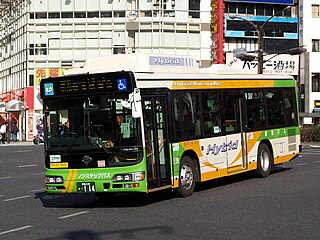
A hybrid electric bus is a bus that combines a conventional internal combustion engine propulsion system with an electric propulsion system. These type of buses normally use a Diesel–electric powertrain and are also known as hybrid Diesel–electric buses.

Stagecoach North East operates both local and regional bus services in County Durham, Cumbria, Northumberland, North Yorkshire and Tyne and Wear, England. It is a subsidiary of the Stagecoach Group, which operates bus, coach, rail and tram services across the United Kingdom.
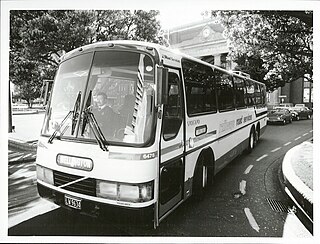
The New Zealand Railways Road Services (NZRRS) was a branch of the New Zealand Railways Department and later the New Zealand Railways Corporation. It operated long-distance, tourist and suburban bus services and freight trucking and parcel services. Its name was New Zealand Railways Road Motor Service until mid-1936.

InterCity is a passenger transport and tourism company in New Zealand. Its parent company is Entrada Travel Group, whose main owners are Ritchies Transport and the Tranzit Group. Entrada operates the country's only long distance bus network, and ferries and cruises in the Bay of Islands.

Red Bus was a bus operator in Christchurch, New Zealand. Red Bus operated public transport bus services around Christchurch on behalf of the Canterbury Regional Council, and it operated the free inner city Shuttle on behalf of the city council until the 2011 Christchurch earthquake.

The Orion VII is a line of low-floor transit buses available in 30' rigid, 35' rigid, and 40' rigid lengths manufactured by Daimler Buses North America's subsidiary Orion Bus Industries between 2001 and 2013 in three generations. The conventional powered buses, either with longitudinally-mounted diesel or natural gas engines, used a T-drive transmission coupling. A series hybrid variant powered by a diesel-driven generator was also available. The Orion VII replaced the fully low-floor Orion VI and high-floor Orion V buses, and was manufactured until its parent company DaimlerChrysler withdrew from the transit bus market in 2013.

A battery electric vehicle (BEV), pure electric vehicle, only-electric vehicle, fully electric vehicle or all-electric vehicle is a type of electric vehicle (EV) that exclusively uses chemical energy stored in rechargeable battery packs, with no secondary source of propulsion. BEVs use electric motors and motor controllers instead of internal combustion engines (ICEs) for propulsion. They derive all power from battery packs and thus have no internal combustion engine, fuel cell, or fuel tank. BEVs include – but are not limited to – motorcycles, bicycles, scooters, skateboards, railcars, watercraft, forklifts, buses, trucks, and cars.

QuayLink was a bus service in Tyne and Wear, England, which connected Gateshead and Newcastle upon Tyne, and later North Tyneside, with the Quayside. Funded by the Tyne and Wear Passenger Transport Executive, the service was launched on 22 July 2005. Operated initially by Stagecoach North East, the service was transferred to Go North East in July 2010 – later being operated commercially from July 2015, following budget cuts.
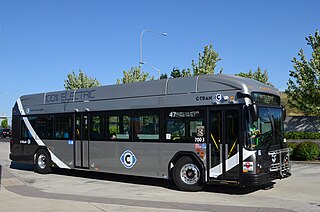
The Gillig Low Floor is a transit bus manufactured by Gillig since 1997. The second low-floor bus design introduced in the United States, the Low Floor originally served as a second product range for the company alongside the Gillig Phantom. As transit bus operators shifted toward low-floor designs, the Low Floor has replaced the Phantom entirely, becoming the sole vehicle platform offered by the company since 2008.
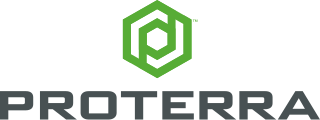
Proterra Inc. was an American electric vehicle and powertrain manufacturer based in Burlingame, California. The company designed and manufactured battery electric transit buses, powertrain systems for other heavy-duty vehicle builders and charging systems for fleets of heavy-duty vehicles.

The Wright StreetLite is a low-floor midibus introduced by Wrightbus in 2010. It was originally available in only one body style before the door forward and StreetLite Max variants were introduced in 2011 and 2012 respectively. Production of all variants of the StreetLite was briefly suspended due to Wrightbus entering administration in September 2019.
Leopard Coachlines is a tour bus service operator based in Christchurch, New Zealand, with a depot in Auckland. It operates tourist coach trips, charter services to Mount Hutt ski field, and tours for schools and groups.

The BYD K-series bus are a line of battery electric buses manufactured by the Chinese automaker BYD, powered with its self-developed lithium iron phosphate battery, featuring a typical operating range of 250 kilometres (160 mi) per charge under urban road conditions. It is available in several different nominal lengths, from 7.0 to 13.7 m and also as a 18 m (60 ft) (articulated) bus. The rear axle is powered by two electric traction motors; the battery capacity and motor power of each model varies depending on the nominal length and passenger capacity.

Go Bus Transport Ltd is a large bus company in New Zealand owned by Australian-based transport operator Kinetic Group. The company is based in Hamilton, New Zealand, and runs bus services in Hamilton, Hawke's Bay, Tauranga, Christchurch, Gisborne, Dunedin and Invercargill.

The Alexander Dennis Enviro500 MMC is a low-floor, three-axle double-decker bus produced by the British bus manufacturer Alexander Dennis since 2012, replacing the Alexander Dennis Enviro500. The Enviro500 MMC is available powered by either Euro VI diesel or hybrid-electric and later fully-electric powertrains.

The Shuttle was a free bus service in Central Christchurch, New Zealand. Introduced in December 1998, the popular service represented the first use of turbine-electric hybrid vehicles in New Zealand. It was operated until the February 2011 Christchurch earthquake and carried about one million passengers per year. It was not reinstated after the central city cordons were removed in 2013.
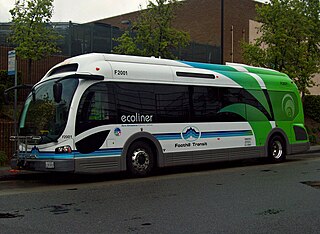
The Proterra EcoRide BE35 is a 35 foot (11 m) fast-charge battery electric bus that seats 38 with a total passenger capacity of 60 in its composite low floor body. Foothill Transit was the first transit agency to operate the buses in revenue service, starting in September 2010. It is the first 30 ft (9 m) or larger, heavy-duty all-electric bus ever to complete federally required durability, reliability and safety testing at the Bus Research and Testing Center in Altoona, Pennsylvania. The 12yr/500,000 mi (800,000 km) STURAA test was completed on March 5, 2012.






















